Otoguro set to start on tender foot down last path to Paris
Tuesday, December 19, 2023 - 09:01 By Ken Marantz

TOKYO (December 18) -- The last time the wrestling world saw Tokyo Olympic champion Takuto OTOGURO, he was leaving Belgrade with no medal from the World Championships and, more importantly, without a qualifying spot for Japan at the 2024 Paris Olympics.
This week, Otoguro will start on the lone path to Paris remaining for him, hoping the foot injury that plagued him throughout the year has recovered enough to prevail at the Emperor's Cup All-Japan Championships, to be held December 21-24 in Tokyo.
Otoguro, the Tokyo gold medalist at freestyle 65kg, will need to win his second straight title and fourth overall to earn a ticket to the Asian Olympic qualifying tournament in Bishkek in April, and, if unsuccessful there, the World Olympic qualifier in May in Istanbul.
"He has had less time to recover from the injury at the World Championships than he did leading up to it," said national freestyle coach Shozo MAEDA, who also works privately with Otoguro. "But the current state of his foot is much better than at the World Championships."
The other weight class in the spotlight will be women's 68kg, where a power-packed lineup will look to nudge Ami ISHII out of the Olympic spot that she secured for Japan by winning the fifth-place playoff in Belgrade.
Japan clinched 10 berths in Paris in Belgrade -- two each in the two men's styles and all six in women's wrestling -- but the entries in the nine others have been decided as those wrestlers won medals in Belgrade to fulfill the Japan federation criteria that allows them to automatically fill the spot themselves.
The nine with tickets to Paris are: Rei HIGUCHI (57kg) and Daichi TAKATANI (74kg) in freestyle; Kenichiro FUMITA (60kg) and Nao KUSAKA (77kg) in Greco; and Yui SUSAKI (50kg), Akari FUJINAMI (53kg), Tsugumi SAKURAI (57kg), Sakura MOTOKI (62kg) and Yuka KAGAMI (76kg) in women's wrestling.
None are entered in the Emperor's Cup, but each will have the first option of deciding whether to compete at the Asian Championships, to be held the week before the Asian Olympic qualifier in Bishkek.
Otoguro suffered the right foot injury at a national team camp in early January, which caused him to pull out of this year's Asian Championships and hampered him at the Meiji Cup All-Japan Invitational Championships in June, which he still won to make the team to Belgrade.
The plan was to win a medal there and secure his place in Paris, but the injury worsened as he was dealt a second-round loss by fall by eventual champion Iszmail MUSZUKAJEV (HUN), whom Otoguro had beaten at the Tokyo Olympics. Otoguro defaulted in the repechage, giving up his chance for a medal or a Paris berth.
Maeda said that Otoguro started full-fledged practice in November and all has been going well so far. "Of course, I can't say he's 100 percent, but he's close to it," he said. "He's got in his mind what the limits of his movement are, and he's adjusted his wrestling style a little. By covering for that, I don't think the foot is going to be a problem."
With a Paris ticket on the line, there is no shortage of wrestlers ready to take on the top-seeded Otoguro, some going up or down as many as two weight classes. There are 27 entries at 65kg, meaning Otoguro's foot will have to hold up for four matches.
Maeda said he's psychologically ready for the challenge.
"At the World Championships, he had the injury and he felt he did not train enough," Maeda said. "This time, he created a good training environment. Although he's not the type who usually leaves his base, he went back to his alma mater Yamanashi Gakuin University and other places so he could have strong practice partners and do more sparring. Because of that, his mental state is good."
Leading the attempt to upend Otoguro will be Ryoma ANRAKU, the 2022 world U23 bronze medalist who won a bronze at the Asian Championships in Otoguro's absence. Anraku lost to Otoguro in the final at both last year's Emperor's Cup and this year's Meiji Cup, and will be determined to finally turn the tables.
Kaiki YAMAGUCHI, the Asian Games bronze medalist, will be looking to regain the Emperor's Cup title that he won back-to-back in 2020-2021 -- also in Otoguro's absence. He lost a close 3-2 decision to Otoguro at the Meiji Cup, although the Olympic champ was definitely not at his best.
Among the more intriguing entries are Toshihiro HASEGAWA and Yuto MIWA, who would be 17 kilograms apart if they were wrestling in their usual weight classes.
Hasegawa, this year's Asian Games gold winner at 57kg, has experience at a heavier weight as a 2021 world bronze medalist at 61kg, but this will be his first-ever tournament at 65kg. Miwa will be coming from the other direction -- he was the runner-up to Takatani at 74kg at the Meiji Cup, and then won a playoff to make the Japanese team to Belgrade at 79kg. The 25-year-old last wrestled under 70kg as a high schooler in 2015.
Also worth watching is 18-year-old Rin SAKAMOTO, who became just the second high schooler in history to win a Meiji Cup freestyle title when he triumphed at 61kg.
68kg features who's who of top wrestlers
As the lone women's spot in Paris still up for grabs, the 68kg division may not have the quantity of entries as freestyle 65kg, but it certainly does not lack the quality. In fact, it may just be the greatest aggregation of talent in one weight class in tournament history.
Of the 12 entries, half have won a senior world gold or silver medal over the past three years. Three others are past national champions. Another won a world U20 gold medal this year.
Can Ishii claim the ticket to Paris that she brought back to Japan? A title will make it hers; a loss and the 2022 world silver medalist will then face the eventual champion in a playoff at a date to be determined.
The main rivals looking to get through the door to Paris that Ishii reopened will be Miwa MORIKAWA, Nonoka OZAKI and Yukako KAWAI, with Masako FURUICHI and Rin MIYAJI regarded as outside threats.
Morikawa, the 2022 world 65kg champion who lost to Ishii at last year's Emperor's Cup, beat her in the semifinals en route to gold at the Meiji Cup to set up a playoff between the two for the world team spot. Ishii pulled off a close 2-1 victory to earn the trip to Belgrade.
Morikawa had a front-row seat to Ishii's failure that suddenly rekindled her Olympic dream as she competed at 72kg in Belgrade, where she took home a bronze medal.
Also in Belgrade was Ozaki, who had lost out at 62kg to Motoki, but like Morikawa, made the team in a non-Olympic weight. She moved up to 65kg and took the gold. She has the skill and desire, but it will be interesting to see how she handles the additional weight at 68kg.
While past performance does not ensure future success, Ozaki may get a boost in confidence knowing that she is 3-0 in career meetings with Ishii, her most recent win coming in 2020, and 2-0 against Kawai.
Kawai will also be punching above her weight, as she won the gold medal at 62kg at the Tokyo Olympics. She also failed to displace Motoki in the race to Belgrade and then gave 68kg a shot, but came up short when she lost in the Meiji Cup final to Morikawa.
Furuichi, the oldest in the group at 27, is also a member of the world "grand slam" club, having added the senior 72kg title in 2021. She also has a pair of world bronzes from 2019 and 2022.
Miyaji drew global attention at the 2021 World Championships in Oslo, where she stunned Olympic champion Tamyra MENSAH STOCK (USA) in the 68kg semifinals before suffering a serious knee injury in the final and having to settle for the silver. The collegian has struggled to regain her form after a long rehab, but cannot be counted out.
While there are no other Olympic places at stake, two other women's weight classes are worth noting.
Kawai's older sister Risako KINJO, while denied a chance at a third Olympic gold, will be defending her 59kg title as she continues her wrestling career while being the mother of a toddler.
At 50kg, a potential final between 2021 world champion Remina YOSHIMOTO and current world U23 champion Umi ITO could be regarded as a de facto world silver-medal match. Since 2020, neither has lost to anyone, either in Japan or abroad, other than the unbeatable Susaki. They have met each other four times in that span, with Yoshimoto, two years older at 23, winning all four.
Takatani chases legends, 4th Olympics
In other men's weight classes, veteran Sohsuke TAKATANI will be looking to tie a pair of legends for most career national titles -- and keep alive his bid to appear at a fourth Olympics -- when he takes the mat at freestyle 86kg.
The 34-year-old Takatani, the older brother of the Paris-bound Daichi at 74kg, has won 12 consecutive golds at the Emperor's Cup over four weight classes, the last three at 92kg. A victory would tie him with Saori YOSHIDA and Kaori ICHO for third on the all-time list for overall titles. In terms of consecutive titles, a 13th in a row would break a tie for second with Kyoko HAMAGUCHI.
But going down a weight class in no way makes things easier. The biggest obstacle in Takatani's path to Paris is defending champion Hayato ISHIGURO, who beat him 3-0 in the final of the Meiji Cup in June. That earned Ishiguro, an Asian bronze medalist, a ticket to Belgrade, where he made the fourth round and placed 13th.
Winning an Olympic medal remains an obsession for Takatani, a world silver medalist in 2014 at 74kg. His highest finish at an Olympics was a seventh place at the 2016 Rio Games.
Among the others who could pose problems for those two is Tatsuya SHIRAI, who became Japan's heaviest male world champion on any level when he won the U23 gold at 86kg in 2022. Ironically, he broke the record set by Ishiguro, who captured the world U20 gold at 79kg in 2018.
Also worth watching are collegians Fumiya IGARASHI, who established his credentials this year by taking a silver medal at the World U20 Championships, and Yudai TAKAHASHI, who made the first of his two appearances at a senior World Championships as a high schooler in 2019 and has always seemed on the brink of a breakout performance.
There is an added incentive at 86kg. The odds of the winner earning one of the two Paris tickets available at the Asian Olympic qualifier are quite high, as three Asian nations, including Iran, secured berths in Belgrade.
Interestingly, Takatani is also entered at Greco 87kg. He qualified by winning the title at the National Non-Student Open in October in the first-ever foray into Greco of his career.
At freestyle 97kg, rising star Arash YOSHIDA and older brother Keiwan could take the term sibling rivalry to a new level as they could face each other in an attempt to dethrone defending champion Takashi ISHIGURO, Hayato's older brother.
The 19-year-old Arash, whose father is Iranian and runs the kids wrestling club where he got his start in the sport, turned heads when he won the gold medal at 92kg at the Asian Championships last April -- beating an Iranian in the first round in his first-ever international match -- then finished fifth at the worlds in Belgrade.
With Japan still not qualified at 86kg or 97kg for Paris, many wondered which way Yoshida would go. In the end, he decided to go up in weight, and prepared by winning the national collegiate title at 97kg last month.
Keiwan, five years his senior, was also a collegiate star, but never had the success on the global level that his younger brother has already enjoyed. He made the final of the Emperor's Cup once, losing in 2021 to Ishiguro, and qualified this year by winning the second-tier National Games tournament in September.
The most enticing Greco division on tap will be 67kg, which looks to come down to another clash between world team member Kyotaro SOGABE and Asian Games gold medalist Katsuaki ENDO, who are both part of the training group at Nippon Sports Science University.
Endo, 26, has a 5-3 lead in head-to-head meetings dating back to 2019, but the 22-year-old Sogabe has won two of the last three, including a playoff in June to make the squad to Belgrade. There, Sogabe won over fans by taking Olympic champion Mohammad Reza GERAEI (IRI) to the limit before suffering a heartbreaking 11-10 loss in the second round.
Sogabe heads into the tournament as the defending champion, while Endo will be looking to regain the crown he first captured in 2018 and won again in 2021.
The wild card in the weight class could be Taishi NARIKUNI, the maverick who won the world gold in freestyle 70kg in 2022 before deciding to try to repeat the feat in Greco. An injury forced him to withdraw from that year's Emperor's Cup, and his bid to make it to Belgrade ended when he lost badly to Endo in the semifinals at the Meiji Cup.
Also worth watching will be Kensuke SHIMIZU, a 2021 world bronze medalist at 63kg who has yet to find success at the Olympic weight.
The tournament is returning to Tokyo's Yoyogi No. 2 Gym, which was originally built for the 1964 Tokyo Olympics and then closed for several years as the area was renovated for the 2021 Games. The Olympic weight classes will follow the same two-day format as at the World Championships, with action through the semifinals on the first day and the repechage round and finals on the second. Non-Olympic weight classes will start and finish on the same day.
Schedule
Thursday, December 21
Through semifinals: FS 74kg, FS 125kg; GR 87kg, GR 97kg, GR 130kg; WW 53kg, WW 62kg, WW 76kg
Through finals: FS 61kg; GR 55kg, GR 72kg; WW 72kg
Friday, December 22
Through semifinals: FS 57kg, FS 86kg; GR 60kg, GR 77kg
Through finals: FS 92kg; GR 63kg; WW 55kg, WW 65kg
Finals: FS 74kg, FS 125kg; GR 87kg, GR 97kg, GR 130kg, WW 53kg, WW 62kg, WW 76kg
Saturday, December 23
Through semifinals: FS 65kg, FS 97kg; GR 67kg; WW 50kg, WW 57kg, WW 68kg
Through finals: FS 70kg, FS 79kg
Finals: FS 57kg, FS 86kg; GR 60kg, GR 77kg
Sunday, December 24
Through finals: GR 82kg; WW 59kg
Finals: FS 65kg, FS 97kg; GR 67kg; WW 50kg, WW 57kg, WW 68kg

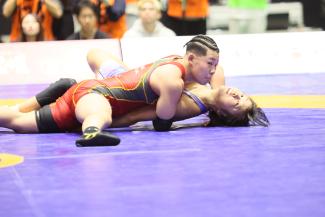
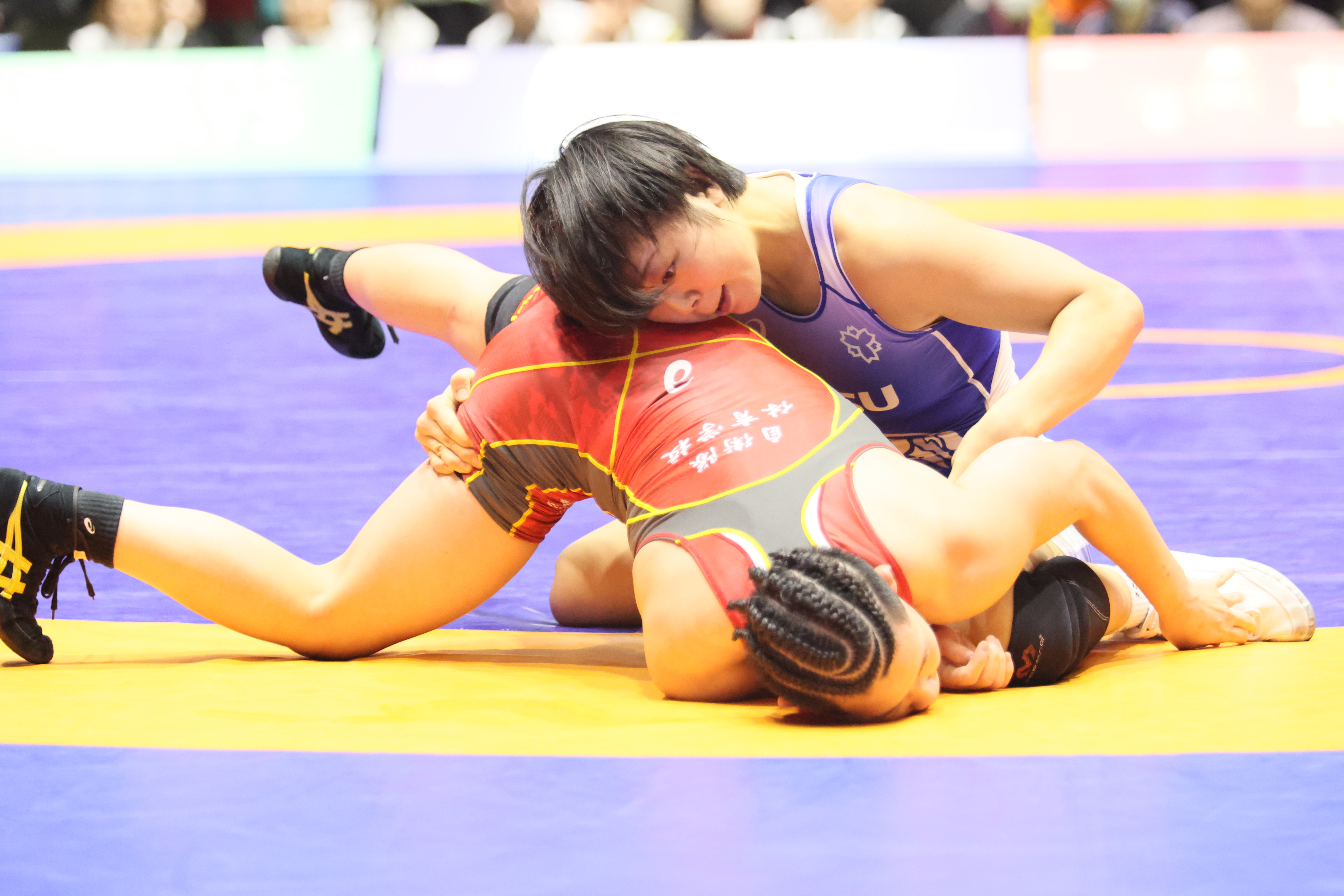 Akari FUJINAMI finishes up the winning takedown against Himeka TOKUHARA in the final minute of the women's 57kg final. (Photo: Takeo Yabuki / wrestling-spirits.jp)
Akari FUJINAMI finishes up the winning takedown against Himeka TOKUHARA in the final minute of the women's 57kg final. (Photo: Takeo Yabuki / wrestling-spirits.jp)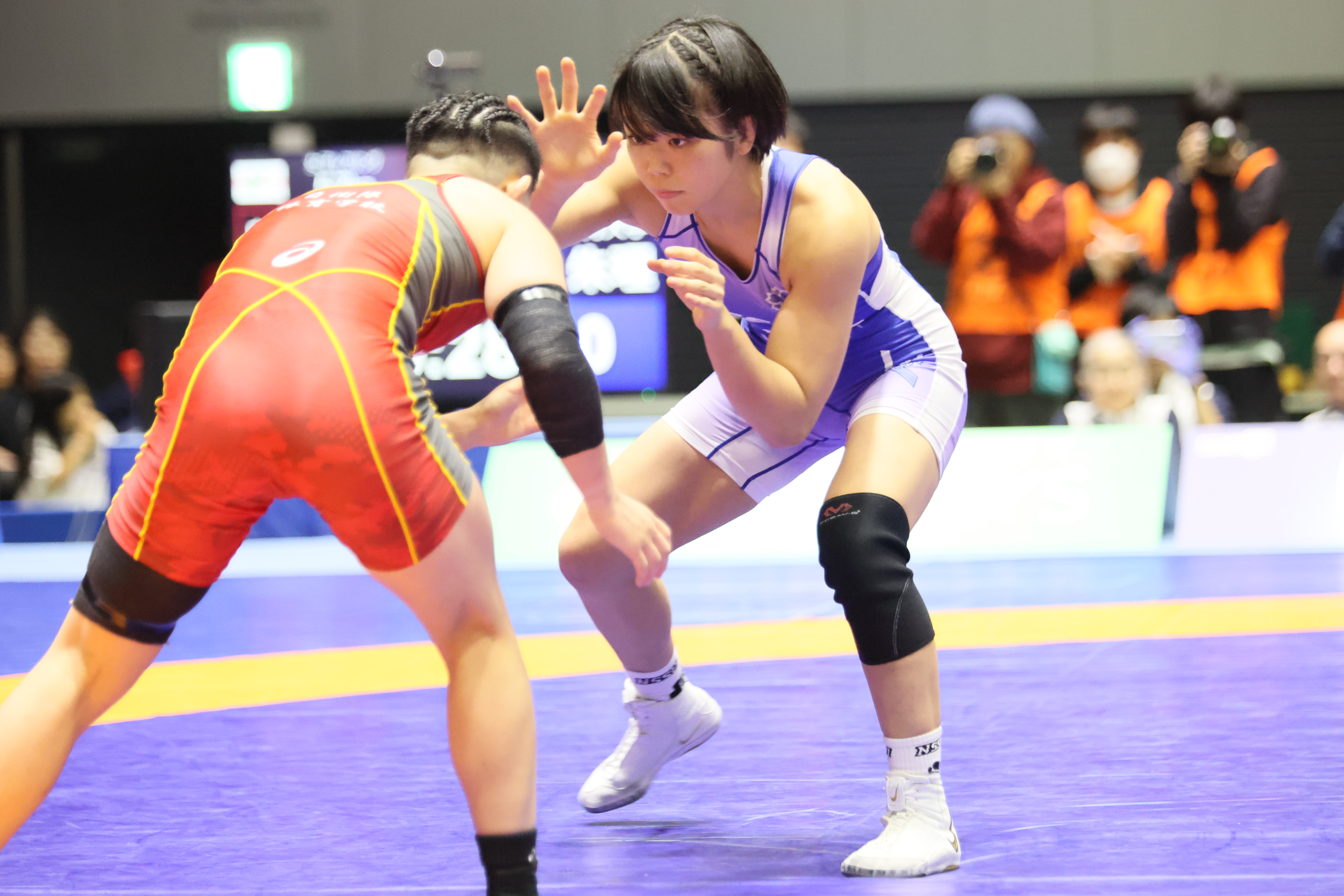 Akari FUJINAMI squares off with Himeka TOKUHARA in the women's 57kg final. (Photo: Takeo Yabuki / wrestling-spirits.jp)
Akari FUJINAMI squares off with Himeka TOKUHARA in the women's 57kg final. (Photo: Takeo Yabuki / wrestling-spirits.jp)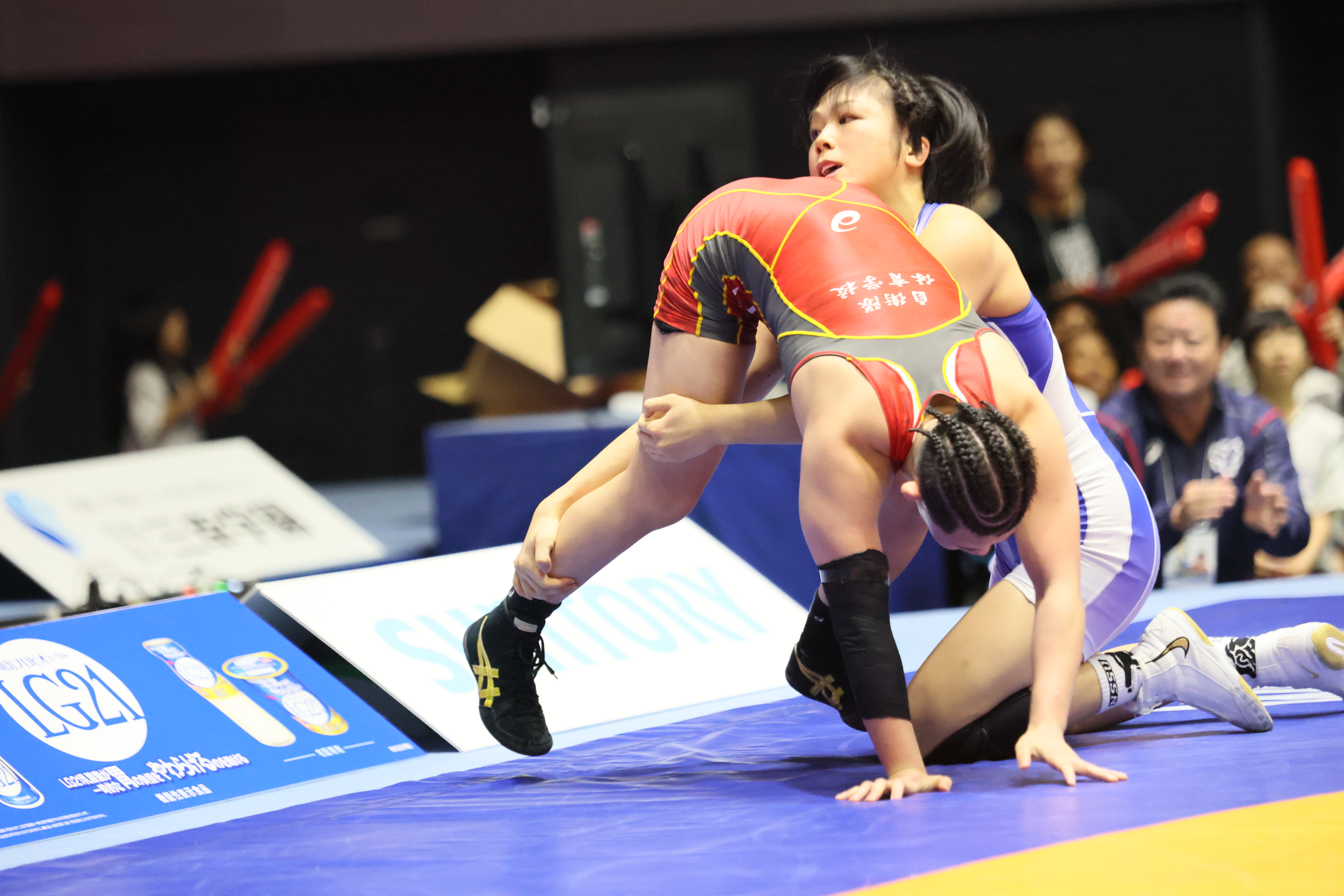 Akari FUJINAMI gets a stepout in the second period of the women's 57kg final. (Photo: Takeo Yabuki / wrestling-spirits.jp)
Akari FUJINAMI gets a stepout in the second period of the women's 57kg final. (Photo: Takeo Yabuki / wrestling-spirits.jp)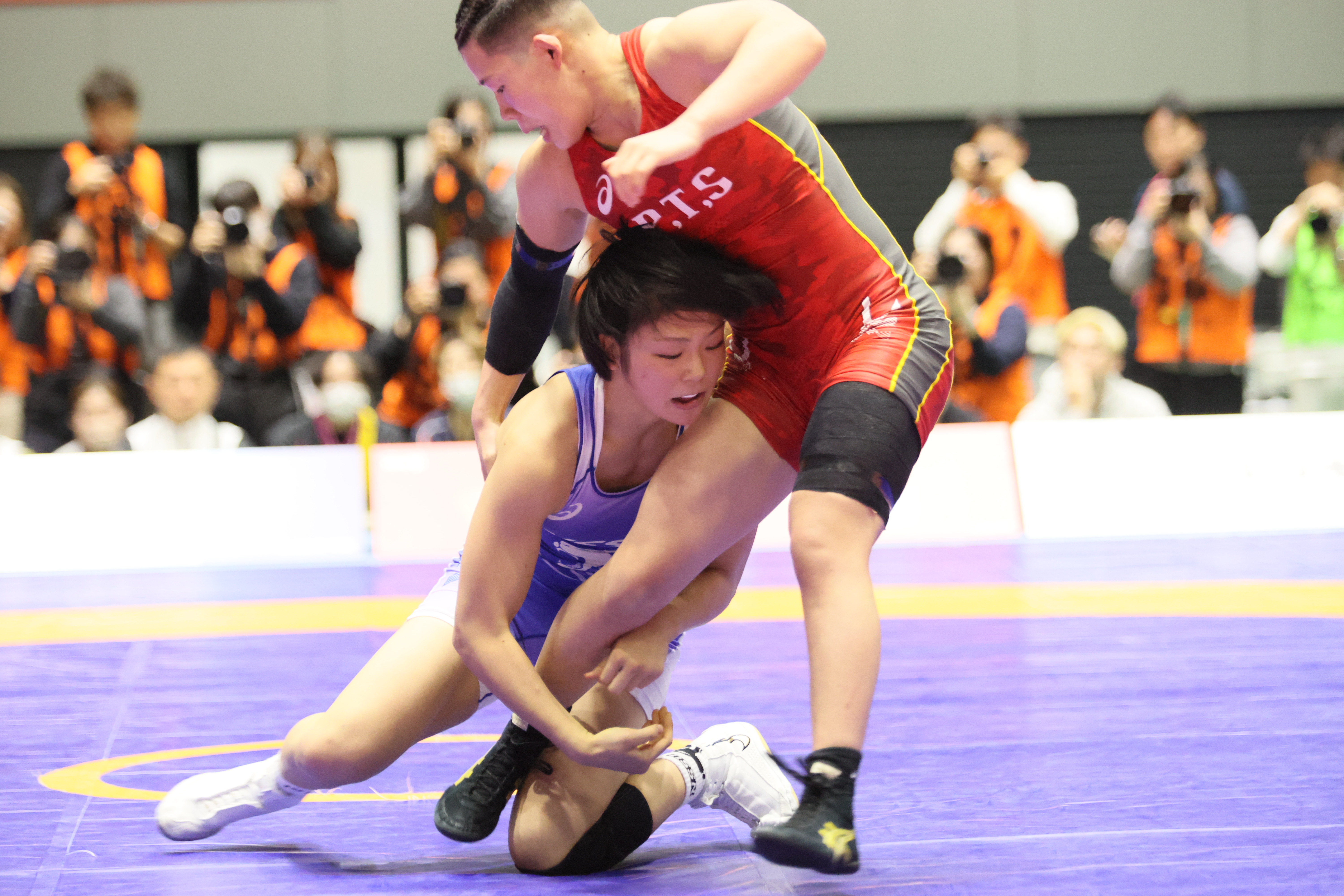 Akari FUJINAMI shoots for the winning takedown against Himeka TOKUHARA in the final minute of the women's 57kg final. (Photo: Takeo Yabuki / wrestling-spirits.jp)
Akari FUJINAMI shoots for the winning takedown against Himeka TOKUHARA in the final minute of the women's 57kg final. (Photo: Takeo Yabuki / wrestling-spirits.jp)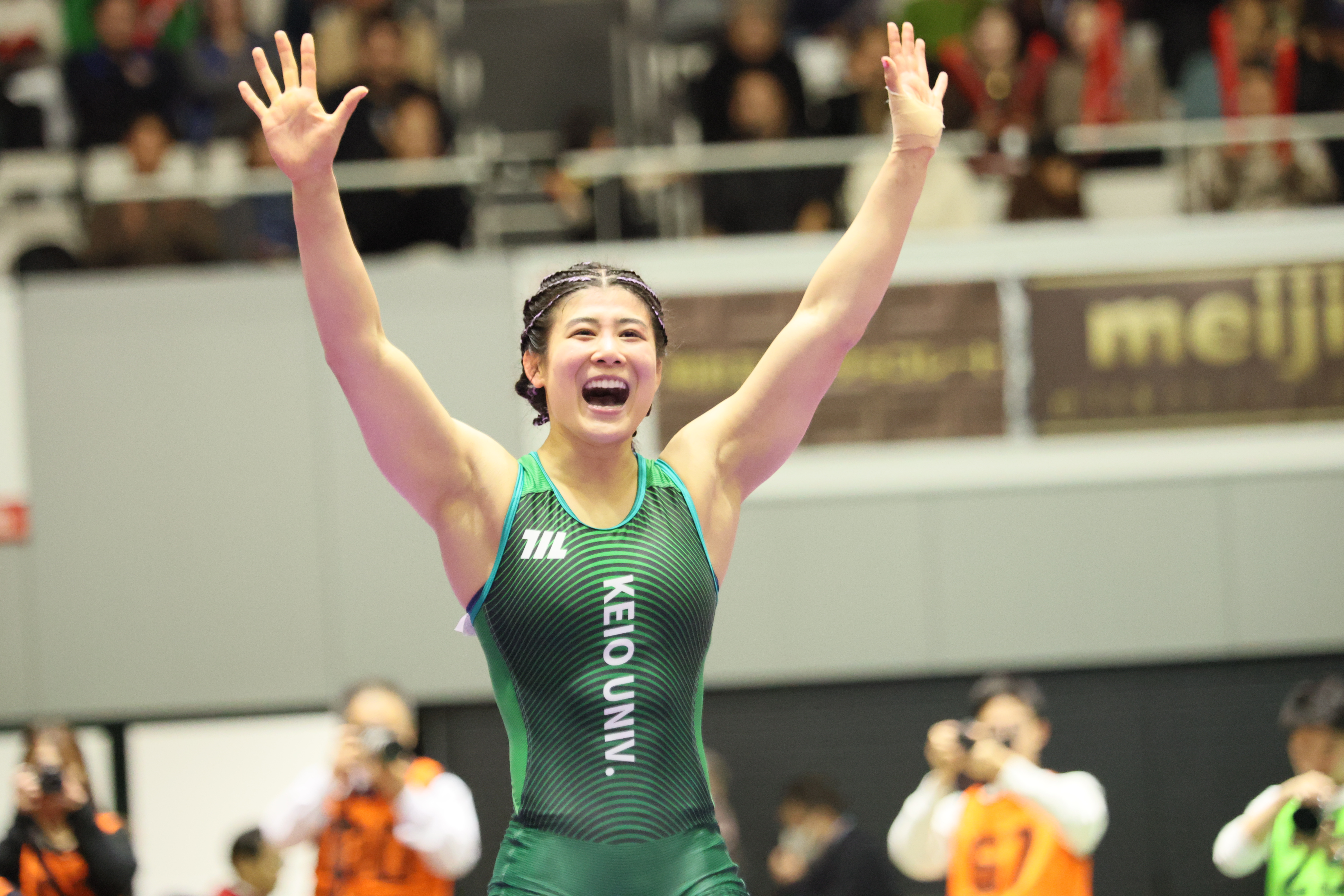 Nonoka OZAKI celebrates her victory over nemesis and Olympic champion Sakura MOTOKI in the women's 62kg final. (Photo: Takeo Yabuki / wrestling-spirits.jp)
Nonoka OZAKI celebrates her victory over nemesis and Olympic champion Sakura MOTOKI in the women's 62kg final. (Photo: Takeo Yabuki / wrestling-spirits.jp)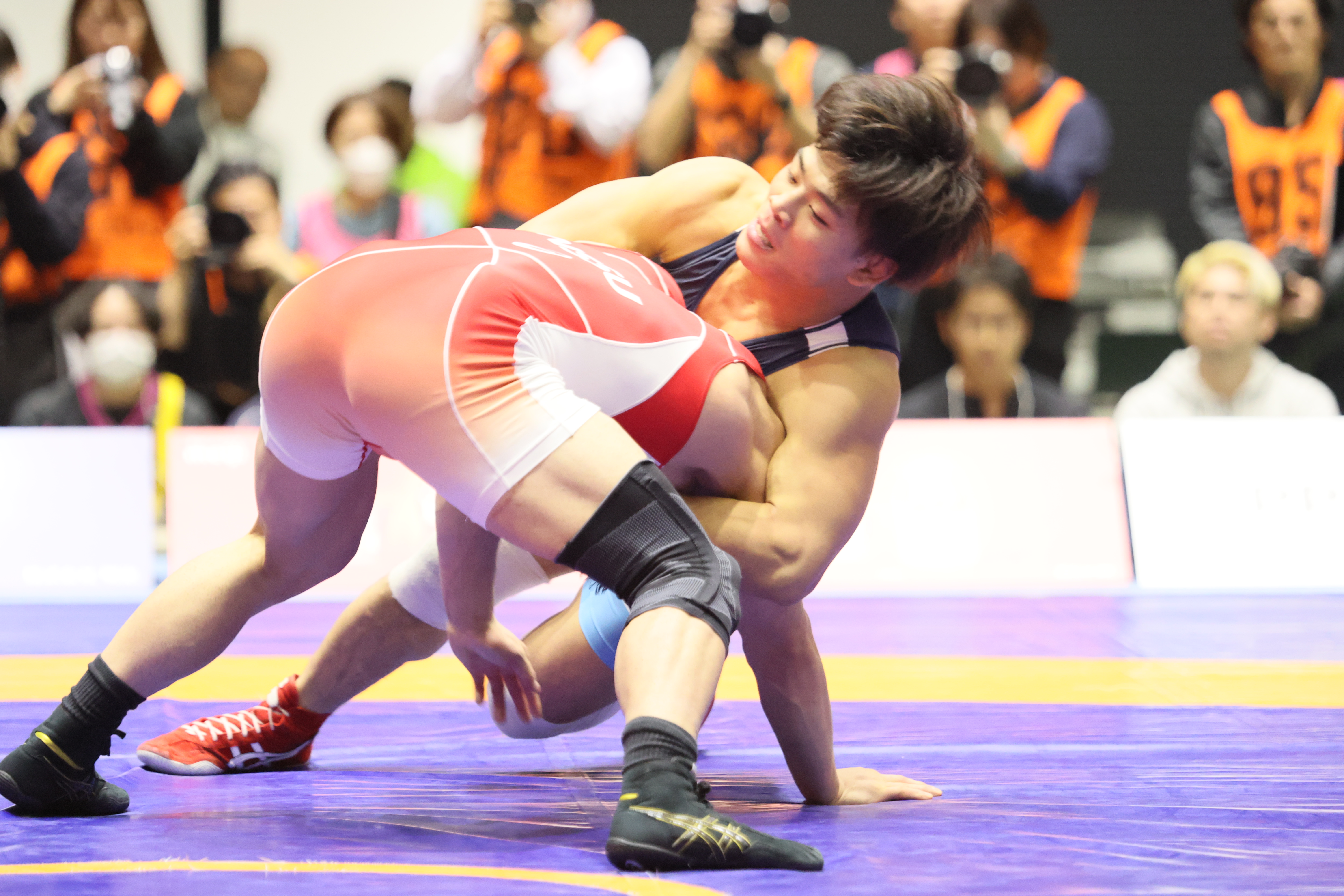 Yoshinosuke AOYAGI unsuccessfully attempts a front body lock roll in the freestyle 74kg final against Kota TAKAHASHI. (Photo: Takeo Yabuki / wrestling-spirits.jp)
Yoshinosuke AOYAGI unsuccessfully attempts a front body lock roll in the freestyle 74kg final against Kota TAKAHASHI. (Photo: Takeo Yabuki / wrestling-spirits.jp)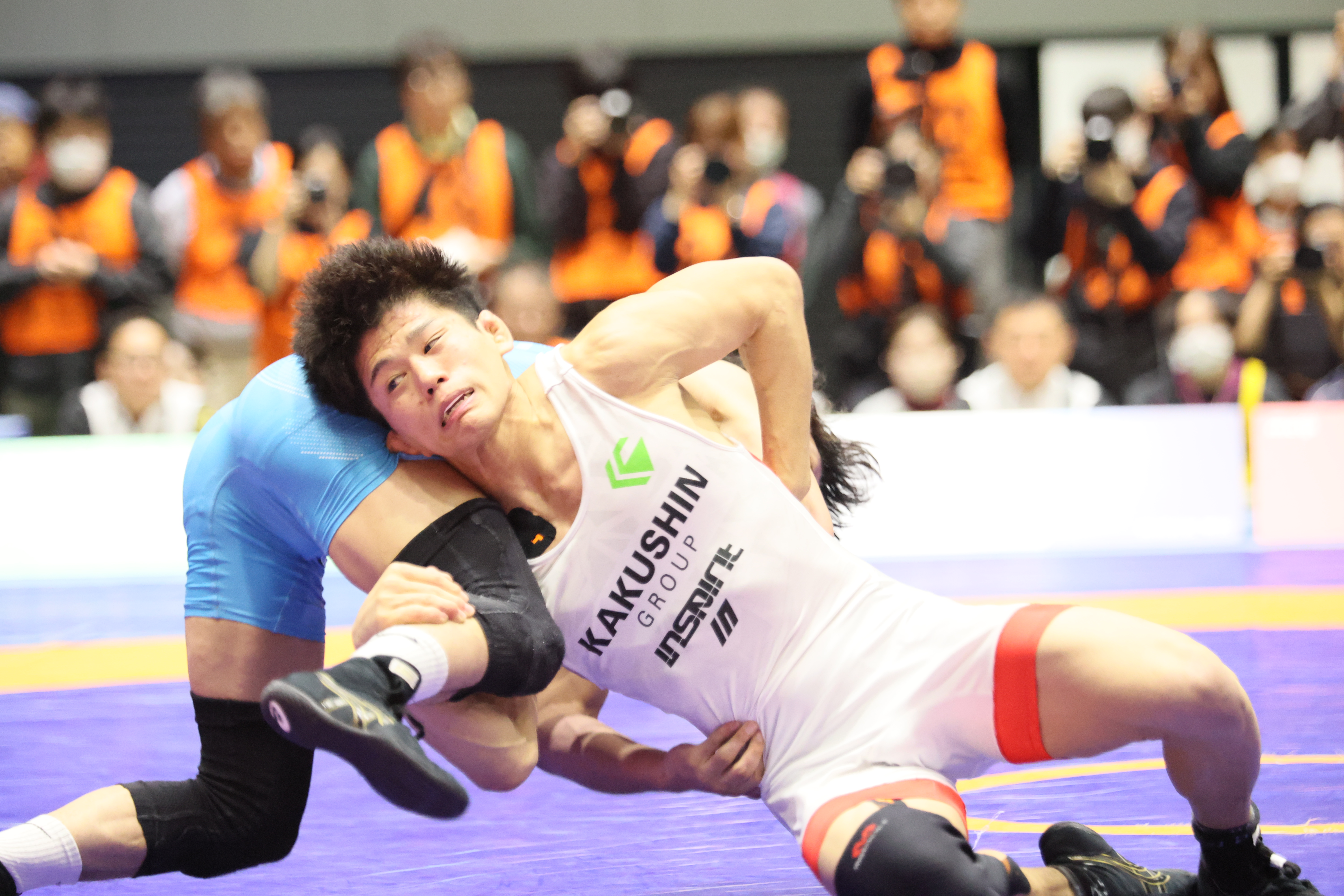 Kotaro KIYOOKA sweeps to the side for a takedown against Takara SUDA in the freestyle 65kg final. (Photo: Takeo Yabuki / wrestling-spirits.jp)
Kotaro KIYOOKA sweeps to the side for a takedown against Takara SUDA in the freestyle 65kg final. (Photo: Takeo Yabuki / wrestling-spirits.jp)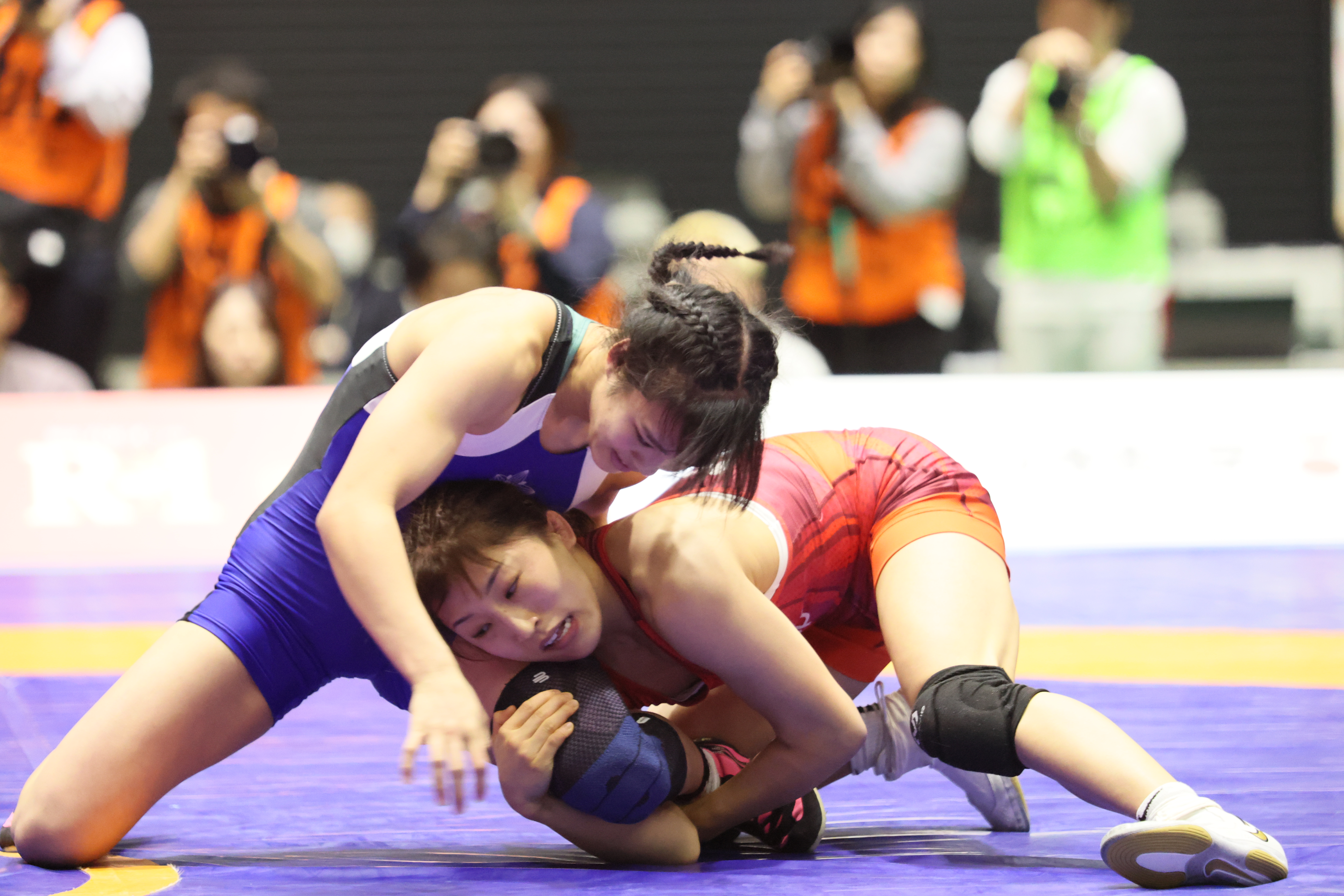 Yui SUSAKI shoots for a takedown against Haruna MORIKAWA in the women's 50kg final. (Photo: Takeo Yabuki / wrestling-spirits.jp)
Yui SUSAKI shoots for a takedown against Haruna MORIKAWA in the women's 50kg final. (Photo: Takeo Yabuki / wrestling-spirits.jp)
Share your thoughts.
Comments